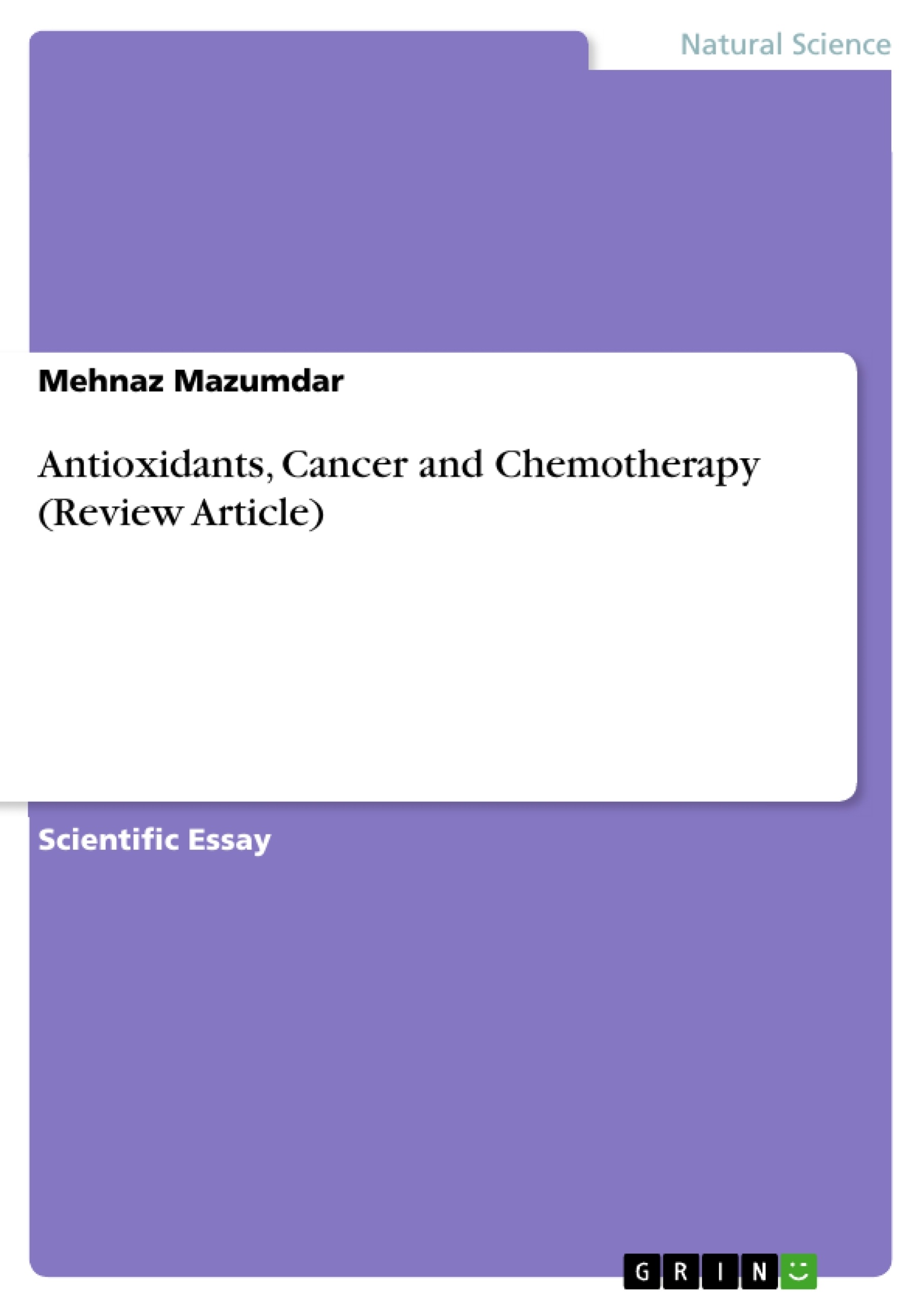The term “antioxidant” coined in 1920 denote substance that fight against any sort of oxidation process (chemical process in which oxygen is caused to combine with other molecules. Most oxidations occur with the liberation of large amounts of energy). The prefix "anti" of the word antioxidants indicate that it works “against” or “in opposition” to the activity of oxidants. Here oxidants indicate free radicals. Free radicals have attracted a great deal of attention in recent years. They are mainly derived from oxygen (reactive oxygen species/ROS) and nitrogen (reactive nitrogen species/RNS), and are generated in our body by various endogenous systems, exposure to different physicochemical conditions or patho- physiological states. Free radicals can adversely alter lipids, proteins and DNA (Deoxyribose nucleic acids) and have been implicated in aging and a number of human diseases including cancer. Antioxidants applications in this regard have become an interesting and introspective arena of research. Antioxidants can fight against these free radicals and protect the body from the various adversaries. When talking of antioxidants, the most widely acclaimed and discussed terminology are the dietary and herbal natural antioxidants which are mostly from plant sources. Scientific evidence strongly holds the promising concept of application of antioxidants against Cancer and also against the side-effects of Cancer Chemotherapy. Antioxidants like Vitamin C, Vitamin E, Quercetin, Curcumin and many others have immense potential to play an important part in Chemotherapy and also in fighting against wide range of cancers.
Keywords: Antioxidant; Cancer; Genetic damage; Vitamin C; Vitamin E; Curcumin; Quercetin
Inhaltsverzeichnis (Table of Contents)
- Introduction
- Foods and antioxidants
- Vitamin C, its application in Cancer and Chemotherapy
- Vitamin E (Tocopherols), its application in Cancer and Chemotherapy
- Quercetin, its application in Cancer and Chemotherapy
- Curcumin its application in Cancer and Chemotherapy
- Lycopene, its application in Cancer and Chemotherapy
Zielsetzung und Themenschwerpunkte (Objectives and Key Themes)
This review article aims to provide an overview of the role of antioxidants in cancer prevention and chemotherapy. It explores the potential of dietary and herbal antioxidants in combating cancer and minimizing the side effects of chemotherapy.
- The role of antioxidants in fighting free radicals and their impact on cancer development
- The application of various antioxidants, including Vitamin C, Vitamin E, Quercetin, Curcumin, and Lycopene, in cancer treatment and prevention
- The potential of antioxidants in mitigating the adverse effects of chemotherapy
- The scientific evidence supporting the use of antioxidants in cancer management
- The importance of incorporating antioxidant-rich foods into a healthy diet
Zusammenfassung der Kapitel (Chapter Summaries)
- Introduction: Introduces the concept of antioxidants, their role in combating free radicals, and their potential applications in cancer prevention and treatment. It highlights the challenges associated with chemotherapy, such as toxicity to healthy cells and the generation of free radicals.
- Foods and antioxidants: Discusses the abundance of antioxidants in various foods, particularly fresh produce, and their potential to minimize chemotherapy side-effects and prevent cancer. It delves into the specific benefits of different antioxidants, including Vitamin C, Vitamin E, Quercetin, Curcumin, and Lycopene, and their application in cancer management.
- Vitamin C, its application in Cancer and Chemotherapy: Examines the properties of Vitamin C as a potent antioxidant and its potential in preventing and treating cancer. It highlights research findings that show its ability to reduce the toxicity of chemotherapy drugs and protect cells from genetic damage.
- Vitamin E (Tocopherols), its application in Cancer and Chemotherapy: Discusses the role of Vitamin E as a fat-soluble antioxidant and its potential in enhancing the efficacy of chemotherapy drugs while minimizing their toxicity. Research findings demonstrate its protective effects against cell damage and its ability to improve the survival rates of cancer patients.
- Quercetin, its application in Cancer and Chemotherapy: Explores the potential of Quercetin, a flavonoid, in cancer prevention and treatment. It acknowledges the mutagenic properties of Quercetin, but also highlights its ability to protect cells from damage induced by chemotherapy drugs.
- Curcumin its application in Cancer and Chemotherapy: Discusses the properties of Curcumin, a compound found in turmeric, as a chemopreventive agent with antioxidant, anti-inflammatory, and anti-mutagenic properties. It explores research findings that suggest its potential in reducing the toxicity of various chemotherapy drugs.
- Lycopene, its application in Cancer and Chemotherapy: Examines the role of Lycopene, a carotenoid found in tomatoes and other red fruits, as a potent antioxidant. Research findings demonstrate its ability to inhibit tumor growth and reduce the risk of various cancers.
Schlüsselwörter (Keywords)
This review article focuses on the role of antioxidants in cancer prevention and chemotherapy. Key concepts include the generation and impact of free radicals, the benefits of various dietary antioxidants, and their potential applications in mitigating the side effects of chemotherapy and preventing cancer. Specific antioxidants discussed include Vitamin C, Vitamin E, Quercetin, Curcumin, and Lycopene.
- Quote paper
- Dr. Mehnaz Mazumdar (Author), 2011, Antioxidants, Cancer and Chemotherapy (Review Article) , Munich, GRIN Verlag, https://www.grin.com/document/176638




